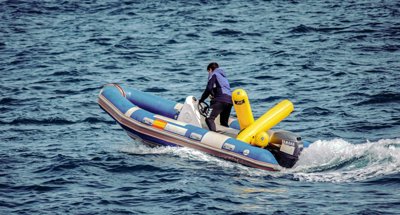Research at Queen’s University Belfast (QUB) has developed new methodologies using integrated GI Science and Geoscience tools to assist the search for buried and water-sunken objects.
Issue
Law enforcement and search and rescue often require forensic searches in challenging aquatic environments such as ponds, rivers, ditches, and flooded quarries for recovery of human remains, drugs, weapons, explosives, and toxic materials. The forensic search for objects submerged in water is under-developed compared to terrestrial searches.
Approach
The QUB water-based search research has developed a sequential multi-proxy strategy. This involves a GIS-based desktop study, as well as sonar, geophysics, and survey endoscope methods that provide targets for scent dogs and divers during the search for water bodies containing items of forensic interest. Working with professional search partners, the team developed a three-step methodology for forensic search in freshwater environments.
Impact
Search specialists in the National Crime Agency and Home Office have consistently asked for the team’s support in applying the search methodology in problematic locations for serious crime investigations. Nine additional organisations have also requested assistance.
Through the International Union of Geological Sciences Initiative on Forensic Geology and European Network of Forensic Science, the team have provided training internationally to over 200 police officers/forensic investigators throughout Europe, Brazil, Colombia, Argentina, and Australia.
Outreach and public engagement have helped to raise the profile of the multi-proxy water-based search methodologies and geoforensic science more broadly. Articles have featured in The Conversation and Police Professional.
More information
Institution: Queen's University Belfast
Researchers: Dr Alastair Ruffell, Professor Jennifer McKinley, Conor Graham, Dr Brian Johnston
Share this resource
This is an open access article under the terms of the Creative Commons Attribution License (CC BY NC 4.0), which permits use, adaptation, distribution and reproduction in any medium or format, provided the original work is cited and it is for non-commercial purposes. Please contact us for other uses.
How to cite
Royal Geographical Society (with IBG) (2023) Innovative aquatic geoforensics in the search for sunken objects. Available at https://rgs.org/aquaticgeoforensics Last accessed on: <date>
